Salt By Mark Kurlansky Quotes & Sayings
Enjoy reading and share 24 famous quotes about Salt By Mark Kurlansky with everyone.
Top Salt By Mark Kurlansky Quotes
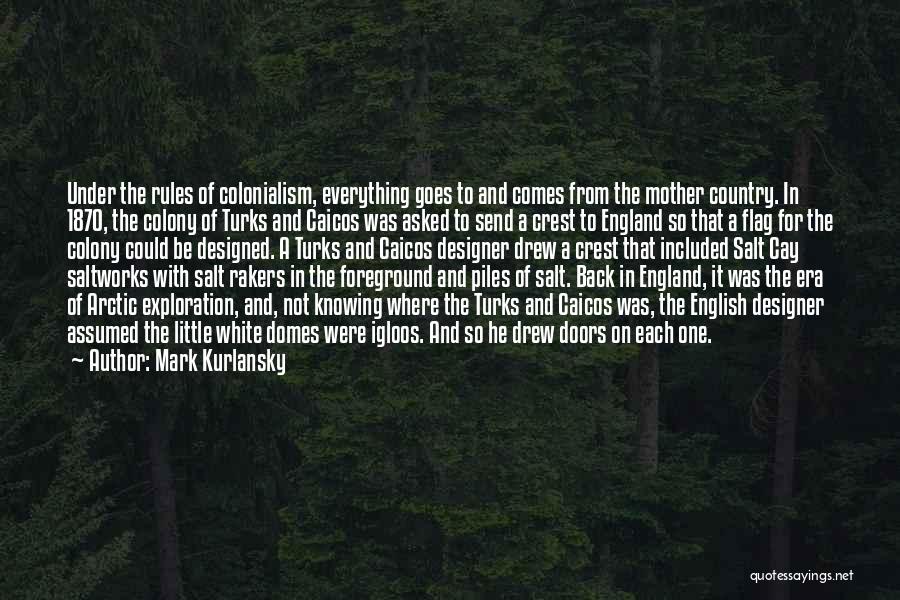
Under the rules of colonialism, everything goes to and comes from the mother country. In 1870, the colony of Turks and Caicos was asked to send a crest to England so that a flag for the colony could be designed. A Turks and Caicos designer drew a crest that included Salt Cay saltworks with salt rakers in the foreground and piles of salt. Back in England, it was the era of Arctic exploration, and, not knowing where the Turks and Caicos was, the English designer assumed the little white domes were igloos. And so he drew doors on each one. And this scene of salt piles with doors remained the official crest of the colony for almost 100 years, until replaced in 1968 by a crest featuring a flamingo. — Mark Kurlansky
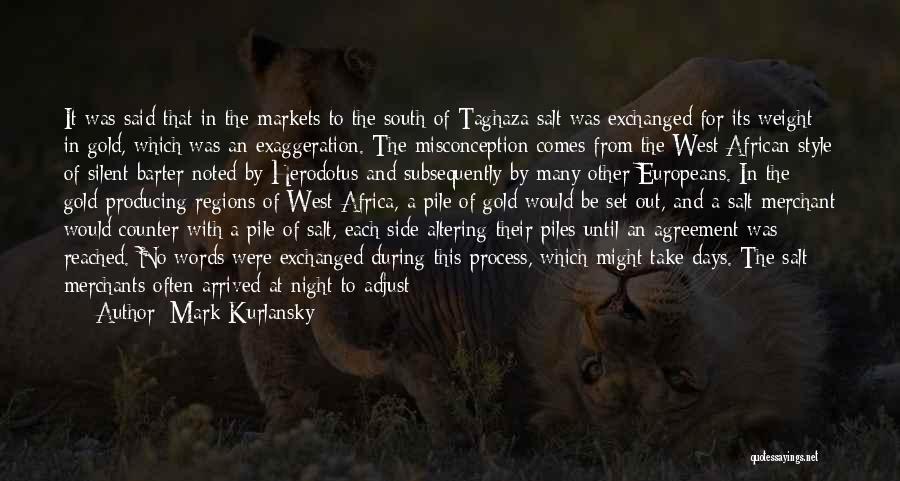
It was said that in the markets to the south of Taghaza salt was exchanged for its weight in gold, which was an exaggeration. The misconception comes from the West African style of silent barter noted by Herodotus and subsequently by many other Europeans. In the gold-producing regions of West Africa, a pile of gold would be set out, and a salt merchant would counter with a pile of salt, each side altering their piles until an agreement was reached. No words were exchanged during this process, which might take days. The salt merchants often arrived at night to adjust their piles and leave unseen. They were extremely secretive, not wanting to reveal the location of their deposits. From this it was reported in Europe that salt was exchanged in Africa for its weight in gold. But it is probable that the final agreed-upon two piles were never of equal weight. — Mark Kurlansky

A 1670 revision of the criminal code found yet another use for salt in France. To enforce the law against suicide, it was ordered that the bodies of people who took their own lives be salted, brought before a judge, and sentenced to public display. Nor could the accused escape their day in court by dying in the often miserable conditions of the prisons. They too would be salted and put on trial. Breton historians have discovered that in 1784 in the town of Cornouaille, Maurice LeCorre had died in prison and was ordered salted for trial. But due to some bureaucratic error, the corpse did not get a trial date and was found by a prison guard more than seven years later, not only salted but fermented in beer, at which point it was buried without trial. — Mark Kurlansky

They leaned over and scooped up handfuls of salt. The police tried to forcibly remove the salt from their hands. A crowd of dissidents ran onto the beach, picked up salt, and were taken away by the police. The protests went on for days, with waves of salt makers followed by waves of police followed by more salt makers. The police called in reinforcements. Soon the jails were filled, and more and more police and protesters were rushing into Inchuri. The police staged charges, harmless but designed to scare. It didn't work. — Mark Kurlansky
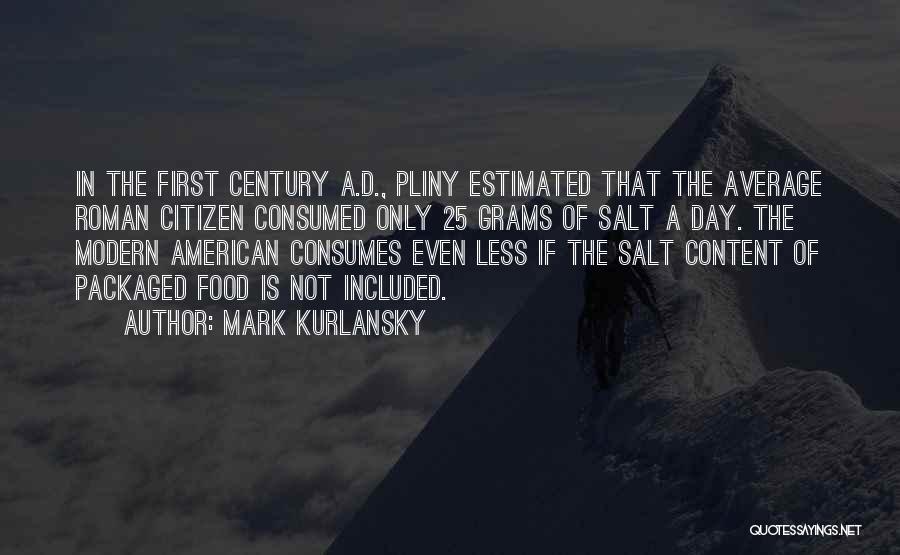
In the first century A.D., Pliny estimated that the average Roman citizen consumed only 25 grams of salt a day. The modern American consumes even less if the salt content of packaged food is not included. — Mark Kurlansky
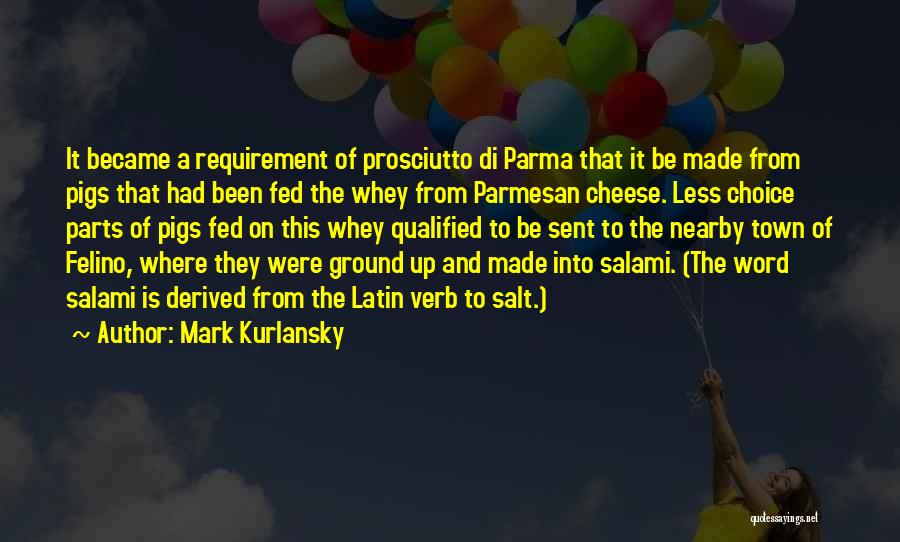
It became a requirement of prosciutto di Parma that it be made from pigs that had been fed the whey from Parmesan cheese. Less choice parts of pigs fed on this whey qualified to be sent to the nearby town of Felino, where they were ground up and made into salami. (The word salami is derived from the Latin verb to salt.) — Mark Kurlansky

In 1352, Ibn Batuta, the greatest Arab-language traveler of the Middle Ages, who had journeyed overland across Africa, Europe, and Asia, reported visiting the city of Taghaza, which, he said, was entirely built of salt, including an elaborate mosque. — Mark Kurlansky

The salt intake of Europeans, much of it in the form of salted fish, rose from forty grams a day per person in the sixteenth century to seventy grams in the eighteenth century. — Mark Kurlansky

Venice manipulated markets by controlling production. In the late thirteenth century, wishing to raise the world market price, Venice had all saltworks in Crete destroyed and banned the local production of salt. — Mark Kurlansky

Rich and poor live together in equality. The same food and similar houses are shared by all; wherefore they cannot envy each other's hearths, and so they are free from the vices that rule the world. All your emulation centers on the saltworks; instead of ploughs and scythes, you work rollers [for salt production] whence comes all your gain. Upon your industry all other products depend for, although there may be someone who does not seek gold, there never yet lived the man who does not desire salt, which makes every food more savory. - Cassiodorus,A.D. 523. — Mark Kurlansky

Massachusetts, like Queen Elizabeth, encouraged salt making through the granting of monopolies to those who showed the skill to produce salt cheaply. The colony granted Samuel Winslow a ten-year monopoly to employ his ideas on salt producing, which is considered the first patent issued in America. — Mark Kurlansky

The history of the Americas is one of constant warfare over salt, — Mark Kurlansky

Theoretically, pickling can be accomplished without salt, but the carbohydrates and proteins in the vegetables tend to putrefy too quickly to be saved by the emerging lactic acid. Without salt, yeast forms, and the fermentation process leads to alcohol rather than pickles. — Mark Kurlansky

It was the seventeenth-century English who gave corned beef its name - corns being any kind of small bits, in this case salt crystals. — Mark Kurlansky

Proteins unwind when exposed to heat, and they do the same when exposed to salt. So salting has an effect resembling cooking. — Mark Kurlansky

One of the gabelle's most irritating inventions was the sel du devoir, the salt duty. Every person in the Grande Gabelle over the age of eight was required to purchase seven kilograms (15.4 pounds) of salt each year at a fixed high government price. This was far more salt than could possibly be used, unless it was for making salt fish, sausages, hams, and other salt-cured goods. But using the sel du devoir to make salted products was illegal, and, if caught, the perpetrator would be charged with the crime of faux saunage, salt fraud, which carried severe penalties. Many simple acts were grounds for a charge of faux saunage. In the Camargue, shepherds who let their flocks drink the salty pond water could be charged with avoiding the gabelle. — Mark Kurlansky

the Egyptians learned very early that the bitter glucides unique to this fruit, now known as oleuropeina, could be removed from the fruit by soaking in water, and the fruit could be softened in brine. The salt would render it not only edible but enjoyable. — Mark Kurlansky

Both Jews and Muslims believe that salt protects against the evil eye. The Book of Ezekial mentions rubbing newborn infants with salt to protect them from evil. The practice in Europe of protecting newborns either by putting salt on their tongues or by submerging them in saltwater is thought to predate Christian baptism. In France, until the practice was abolished in 1408, children were salted until they were baptized. In parts of Europe, especially Holland, the practice was modified to placing salt in the cradle with the child. — Mark Kurlansky
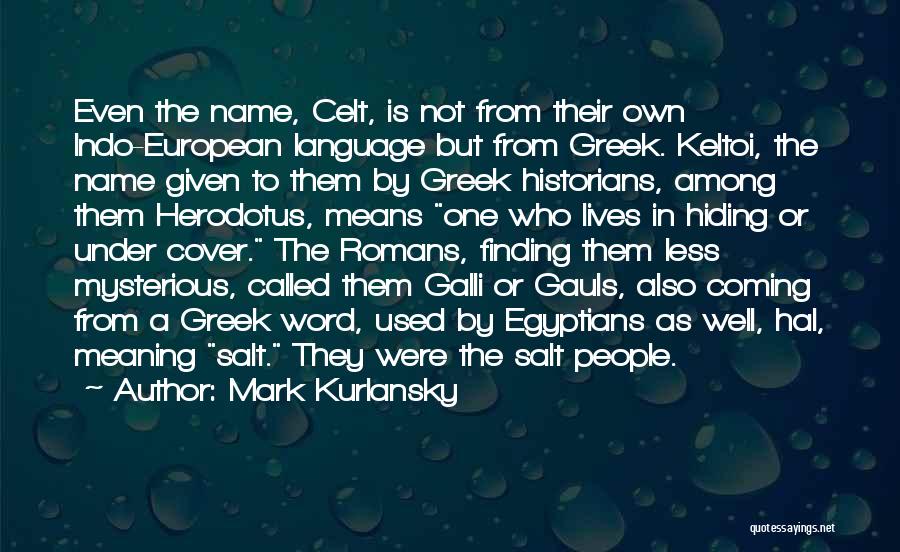
Even the name, Celt, is not from their own Indo-European language but from Greek. Keltoi, the name given to them by Greek historians, among them Herodotus, means "one who lives in hiding or under cover." The Romans, finding them less mysterious, called them Galli or Gauls, also coming from a Greek word, used by Egyptians as well, hal, meaning "salt." They were the salt people. — Mark Kurlansky
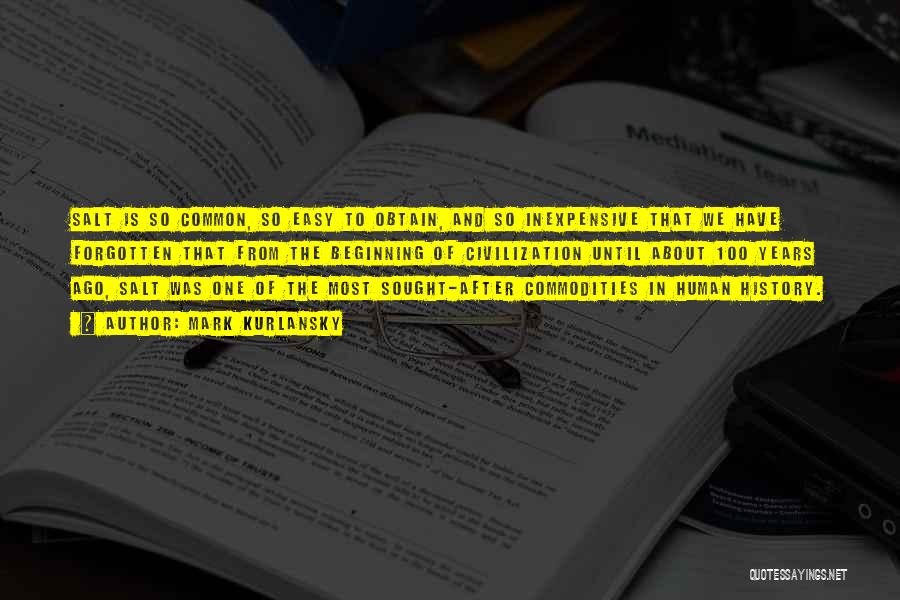
Salt is so common, so easy to obtain, and so inexpensive that we have forgotten that from the beginning of civilization until about 100 years ago, salt was one of the most sought-after commodities in human history. — Mark Kurlansky

It takes two years for the salt to reach the center of a wheel of Parmigiano-Reggiano cheese. — Mark Kurlansky

Were it not for their aversion to pigs, the Egyptians would probably have invented ham, for they salt-cured meat and knew how to domesticate the pig. But Egyptian religious leadership pronounced pigs carriers of leprosy, made pig farmers social outcasts, and never depicted the animal on the walls of tombs. — Mark Kurlansky

Toward the end of the first century A.D., a Confucian government minister had them once more abolished, declaring, Government sale of salt means competing with subjects for profit. These are not measures fit for wise rulers. — Mark Kurlansky
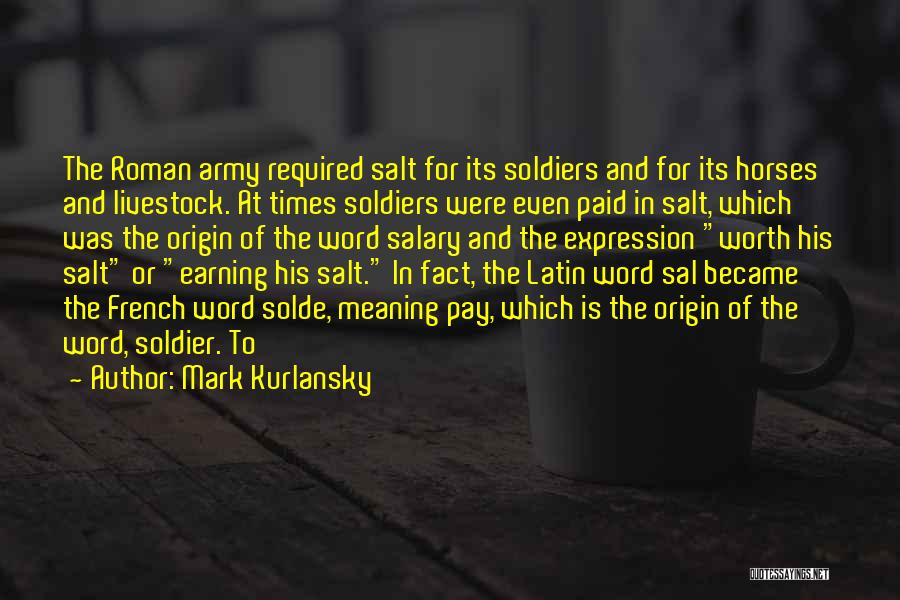
The Roman army required salt for its soldiers and for its horses and livestock. At times soldiers were even paid in salt, which was the origin of the word salary and the expression "worth his salt" or "earning his salt." In fact, the Latin word sal became the French word solde, meaning pay, which is the origin of the word, soldier. To — Mark Kurlansky





